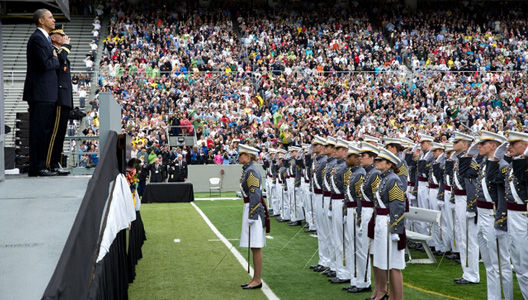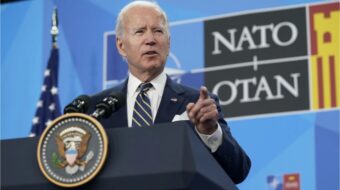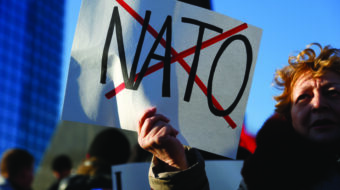
President Obama, in a commencement address at West Point on Wednesday, rebuffed those who are pressing for U.S. military intervention in global hotspots, and made a case for a non-militarist foreign policy. At the same time, however, he advocated for “American exceptionalism” that includes involvement in foreign conflicts, covert operations and drone strikes, and other ways of exerting what he described as necessary “American leadership” in the world.
“[T]o say that we have an interest in pursuing peace and freedom beyond our borders is not to say that every problem has a military solution,” Obama told the graduating class and their families at America’s top military academy. “Since World War II, some of our most costly mistakes came not from our restraint, but from our willingness to rush into military adventures without thinking through the consequences – without building international support and legitimacy for our action; without leveling with the American people about the sacrifices required. Tough talk often draws headlines, but war rarely conforms to slogans.”
“U.S. military action cannot be the only – or even primary — component of our leadership in every instance,” he argued. “Just because we have the best hammer does not mean that every problem is a nail.”
Conservative pundit Robert Kagan, a supporter of aggressive military action, complained to NPR: “If you look at that speech closely, you know, there is a way in which he makes a kind of subtle critique of the general thrust of American foreign-policy since World War II. And I think the critique is one of a nation that was leaning forward and, in some cases, got into involvements like Vietnam and then later Iraq that were a big mistake. I think he is suggesting a different course from what has been the general thrust of American foreign policy for 70 years.”
For some, Obama’s speech evoked one by President John F. Kennedy at American University on June 10, 1963, just months before his assassination. “What kind of peace do I mean and what kind of a peace do we seek?” Kennedy said. “Not a Pax Americana enforced on the world by American weapons of war.” Many at the time believed that, having gone through near-nuclear-war with the Cuban Missile Crisis, and the misguided Bay of Pigs invasion of Cuba, Kennedy was intending to move away from Cold War confrontation. We never got to see what Kennedy actually would have done.
But, like Obama, Kennedy was nevertheless a liberal defender of U.S. capitalism and its power in the world. He would have had to figure out how to advance U.S. “interests” – at their core, “free markets, meaning a free hand for U.S. transnational corporations – while holding back the extreme militarists.
Obama, in his speech this week, attempted to do something like that.
Hitting back against right-wing efforts to label him as “weak” on foreign policy, he rejected the military adventurism of figures like John McCain, and emphasized an approach that included diplomacy and consultation. But Obama indicated that he has not given up the Bush-Clinton-Bush notion of the U.S. as the unipolar world leader.
In his words, “the United States is and remains the one indispensable nation,” and “America must always lead on the world stage. If we don’t, no one else will.”
While advocating multilateralism, what he really seemed to mean by this is getting other like-minded countries to do our bidding – “a strategy that expands our reach without sending forces that stretch our military too thin, or stir up local resentments.” Tellingly, and somewhat shockingly for some, he lumped in among a list of “dangers” we face the fact that “From Brazil to India, rising middle classes compete with us, and governments seek a greater say in global forums.”
Seeing those emerging nations, sometimes referred to as the BRICS countries (Brazil, Russia, India, China, South Africa), as a threat hardly fits what many would consider a multilateral, democratic world outlook.
Obama emphasized working through international bodies, a welcome change for many from the Bush era. However he placed NATO, a U.S./Western Europe Cold War holdover, first on his list, before the United Nations. Yet many commentators have pointed to NATO as part of the problem in conflicts ranging from the Ukraine to Libya.
He called for a “new Counterterrorism Partnerships Fund of up to $5 billion, which will allow us to train, build capacity, and facilitate partner countries on the front lines.” This bypasses the UN.
And, while calling for a diplomatic solution to the Syrian crisis, he said he would pursue aiding rebels there, claiming he would be able to direct support to those who are not terrorists. This flies in the face of evidence so far, which indicates that money and weaponry flowing into Syria has in fact fueled the rise of Islamist extremists.
Obama made no mention of the Israeli-Palestinian crisis, leaving the world to wonder what if anything his administration is planning to do in the wake of the recently collapsed peace talks. He also made no mention of rethinking the U.S. approach to Latin America, even though most of that region objects to much of our existing policies and has indicated they want a different relationship.
The president’s speech has drawn praise for its rejection of the militarism pressed by Republicans but also some Democrats. At the same time, he left many centrist commentators dissatisfied. Jacob Heilbrunn at The National Interest commented: “For foreign policy mavens, at least those inclined toward the realist persuasion, there was a lot to like – the dismissal of military adventurism, for example. And for those inclined toward the liberal internationalist persuasion, there was also a lot to like – the embrace of multilateralism and collective security, for example. Obama reverted – actually, it would be more accurate to say adhered – to his old habit of splitting the difference between various schools of thought.
“But Obama has not made clear what he would substitute for the interventionism of the Bush years. A $5 billion ‘Counterrorism Partnership Fund’?”
From a left viewpoint, the president’s speech indicated his administration’s foreign policy is seeking to get rid of the worst of the Bush era – certainly an important improvement – but hasn’t really grappled with what “multilateralism” and multipolarity mean in a world demanding political and economic sovereignty and social justice.
Photo: President Barack Obama and West Point Superintendent Lt. Gen. Robert L. Caslen participate in the U.S. Military Academy at West Point commencement ceremony at Michie Stadium in West Point, N.Y., May 28, 2014. (Official White House photo by Pete Souza)

MOST POPULAR TODAY

Zionist organizations leading campaign to stop ceasefire resolutions in D.C. area

High Court essentially bans demonstrations, freedom of assembly in Deep South

Communist Karol Cariola elected president of Chile’s legislature

U.S. imperialism’s ‘ironclad’ support for Israel increases fascist danger at home







Comments